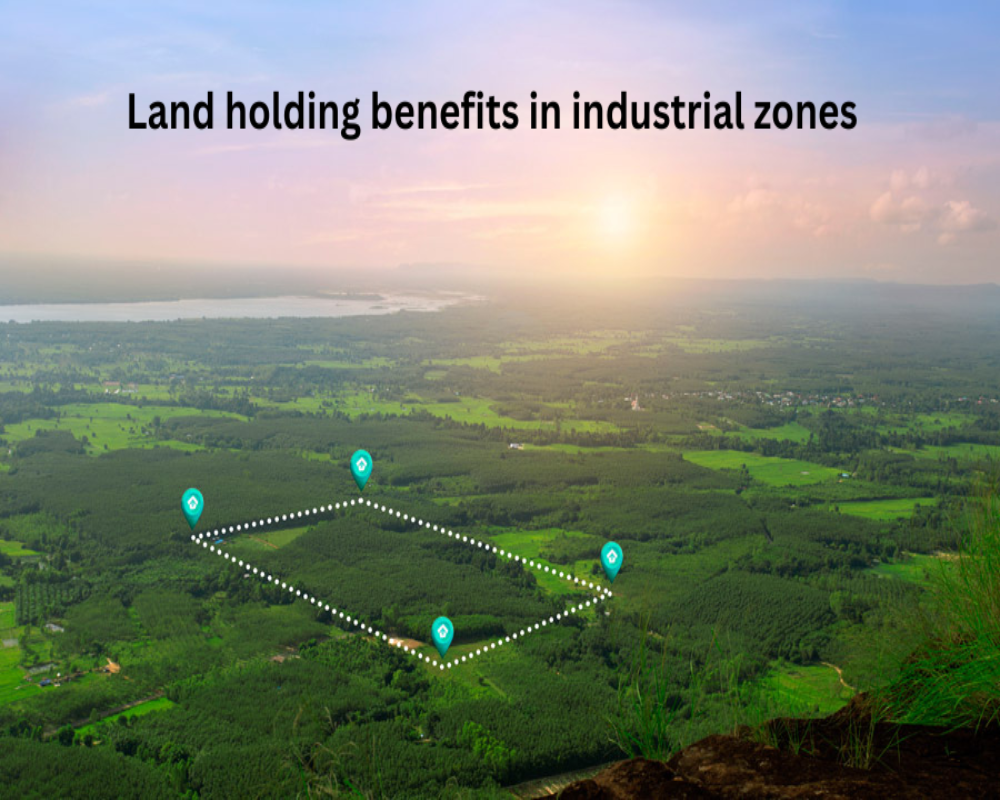Introduction
Holding land in designated industrial zones is increasingly recognized as a strategic asset class for investors, industrialists, and developers. These zones, planned and supported by government policy and infrastructural investment, are designed to foster manufacturing, logistics, and allied activities. As such, owning land in these areas offers unique economic, operational, and long-term investment advantages. Whether the objective is to develop, lease, or sell, holding land in industrial zones positions owners to benefit from growing industrialization, rising demand for space, and favorable regulatory frameworks. This article explores the various benefits that come with landholding in these high-potential regions.
1. Capital Appreciation through Infrastructure Development
One of the most significant advantages of holding land in industrial zones is capital appreciation driven by rapid infrastructure development. Governments and private stakeholders heavily invest in roadways, power grids, water systems, and telecommunications in these zones. As connectivity improves and economic activity intensifies, the surrounding land values naturally escalate. Long-term landholders often witness substantial gains, particularly if they secure land in early-stage or pre-launch industrial zones that later become prime hubs.
2. Guaranteed Demand for Industrial Use
Industrial zones are designed to attract industries such as manufacturing, assembly, warehousing, and logistics. The government’s push for domestic production, export competitiveness, and job creation ensures a constant demand for industrial land. As companies expand or relocate to capitalize on incentives, landholders benefit from the rising demand. This demand makes landholding not just a passive asset but a dynamic one, with multiple monetization options.
3. Rental and Leasing Income Opportunities
Landholders can lease their parcels to manufacturers, logistics operators, or infrastructure developers seeking space without the burden of ownership. Industrial leases are typically long-term and high-yield, often exceeding returns from residential or commercial properties. In developed zones, demand for build-to-suit facilities provides further scope for lease-based income. Holding land gives owners the flexibility to earn consistent cash flow while retaining the core asset.
4. Strategic Partnerships and Joint Ventures
Large land parcels in industrial zones are attractive for joint ventures with developers, industrial players, or logistics firms. Landowners can contribute their property as equity while partners bring capital and technical expertise. This arrangement allows landholders to share in profits from development projects, such as industrial parks or logistics hubs, without fully bearing construction costs. Such collaborations unlock land value in ways that simple sales cannot.
5. Eligibility for Government Incentives and Grants
Many industrial zones come with tax exemptions, subsidies, and development support provided by state or central governments. Landholders who choose to develop or lease their land for eligible industrial activities can access these incentives, reducing setup costs and increasing profitability. These incentives not only enhance the economic attractiveness of the land but also signal long-term commitment from the government, adding credibility to the investment.
6. Hedge Against Inflation and Market Volatility
Industrial land, especially in established zones, serves as a strong hedge against inflation. Unlike currency or equity investments, land retains intrinsic value and appreciates with market and infrastructure growth. Industrial zones, often backed by regulatory protection and long-term planning, offer greater stability than speculative markets. For investors looking for a secure asset in uncertain times, holding land in such zones provides a dependable store of value.
7. Low Maintenance and Operational Overheads
Compared to developed properties, raw or partially developed land in industrial zones requires minimal maintenance. There are no tenant issues, repair costs, or utility management responsibilities unless the land is leased. This makes it ideal for passive investors or institutions looking to park funds in a low-management asset with high appreciation potential. Additionally, industrial zones often offer centralized services, further reducing ownership burdens.
8. Strategic Control and Flexibility in Land Use
Holding land in an industrial zone offers strategic flexibility. Owners can choose to develop factories, warehouses, or logistics terminals, depending on evolving market demand. Alternatively, they can subdivide and sell parcels to different users or retain control over strategic portions for future expansion. This control over land use allows for adaptive planning and maximized returns based on timing and economic cycles.
9. Proximity to Supply Chain and Ecosystem Support
Industrial zones are planned to support end-to-end industrial ecosystems. Holding land in these zones gives businesses proximity to suppliers, buyers, labor pools, and service providers. This proximity reduces operational costs, improves logistics efficiency, and facilitates cluster-based growth. For landholders, this ecosystem effect increases the desirability and marketability of their property, driving better lease or sale prospects.
10. Enhanced Liquidity and Exit Opportunities
As industrial zones mature and attract investment, the liquidity of land within them increases. Institutional buyers, REITs, industrial developers, and multinational companies often seek land in well-established zones, providing exit opportunities to individual holders. The presence of a transparent regulatory framework and public records also simplifies transaction processes, making landholding in such zones more liquid than in disorganized or rural markets.
Conclusion
Landholding in industrial zones offers a unique blend of long-term value appreciation, strategic control, and multiple income avenues. From capital gains and leasing potential to joint ventures and operational flexibility, the benefits are both diverse and substantial. As global and local economies emphasize industrial growth, these zones will continue to gain prominence, making land within them a highly coveted asset. For investors, developers, and businesses alike, strategically holding land in industrial zones is not just a passive investment—it is a proactive stake in the future of industrial development.




